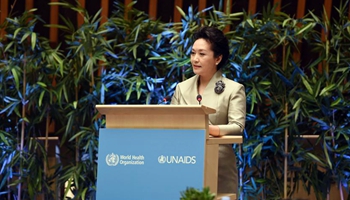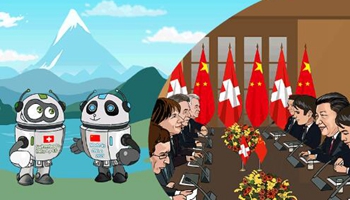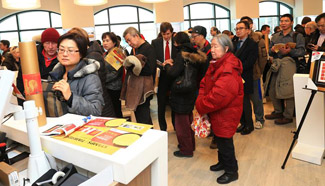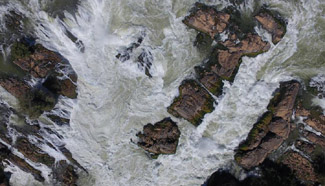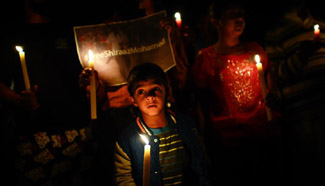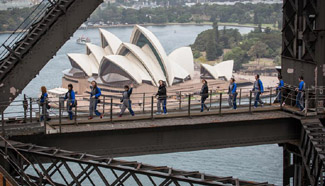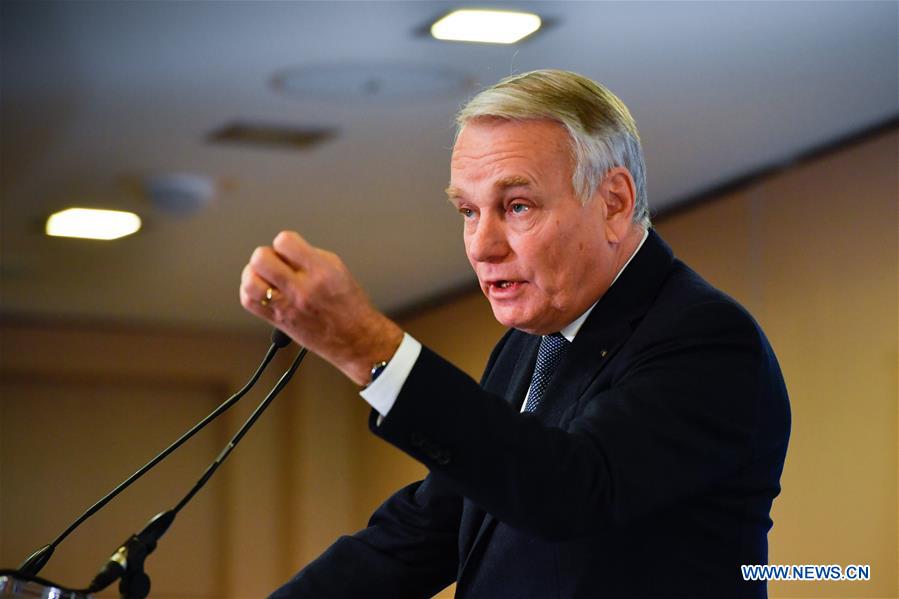
French Foreign Minister Jean-Marc Ayrault addresses a press conference after the Middle East Peace Conference in Paris, capital of France on Jan. 15, 2017. France on Sunday held an international meeting to seek ways to revive the stranded Middle East peace negotiations and to push for the implementation of a two-state solution to restore security in the region after decades of conflict. (Xinhua/Chen Yichen)
by Osama Radi, Emad Drimly
GAZA, Jan. 17 (Xinhua) -- Palestinian analysts said the outcomes of this week's peace conference held in Paris for one day weren't new, but it reactivated the Palestinian cause and promoted it to be on the international agendas as it had been abandoned for many years.
During years of the so-called "Arab Spring," besides an escalation of the conflicts in the region, the analysts believe that Paris peace conference "was an important station, which reiterated the international position towards the two-state solution, ending the Israeli occupation and establishing the Palestinian state.
Around 70 countries representatives attend the peace conference on Sunday, including five major world organizations -- the European Union, the United Nations, the Arab League, and two other African and Islamic organizations.
Following the ministerial meeting held in Paris on June 3, 2016, the participants met in Paris on Sunday and issues a joint declaration, reaffirming that a negotiated solution for two states of Israel and Palestine, living side by side in peace and security, is the only way to achieve enduring peace.
It said that the participants emphasized the importance for the parties to restart their commitment to this solution.
Holding Paris peace conference coincided with an ongoing wave of violence in the Palestinian territories that broke out in October, 2015. According to Palestinian official figures, around 340 Palestinians and about 45 Israelis were killed and hundreds injured.
Officially, the Palestinian leadership welcomed the declaration of the peace conference, while Israel rejected it and declared that it won't be abided by any outcomes of the conference.
Palestinian President Mahmoud Abbas is scheduled to visit Paris within the coming few weeks and will meet the French leaders to debate the coming steps after Paris conference.
Abbas was supposed to be in Paris on the same day when the conference was held, but it was postponed for technical reasons.
Hani el-Masri, a West Bank think-tank member, told Xinhua that Abbas' visit to Paris "would be essential only in case the declaration of Paris peace conference would be presented to the UN Security Council to gain a vote, but now because Abbas wasn't there, the Security Council would be only briefed on the declaration."
"Postponing Abbas' visit to Paris for several weeks is related to a French attempt to convince Israeli Prime Minister Benjamin Netanyahu to attend a three-way meeting in Paris, which will include Abbas and French President François Hollande," said el-Masri.
He stressed that the Palestinians urgently need, more than ever before, to look for an alternative track instead of the bilateral negotiations before the collapse of the two-state solution.
Samir Awadd, the political science professor at Beit Zeit University in the West Bank, told Xinhua that holding the peace conference in Paris and its final declaration, which stressed the two-state solution, "achieved Palestinian gains and renewed the international support to end the conflict with Israel."
"Although Paris peace conference hasn't made any tangible progress on the ground to resolve the Palestinian cause, but it is considered an important cumulative step that put the general outlines for a solution following several years of deadlock in the peace process."
However, some experts expressed their disappointments over the outcomes of the Paris conference.
Muhanad Abdul Hamid, a West Bank political analyst, told Xinhua that the substance of the peace conference outcomes "represented despair to the Palestinians, because the conference had so far failed to internationalize the conflict after so many years of failure in the peace negotiations."
"The conference is pushing the bilateral Israeli-Palestinian negotiations," said Abdul Hamid, adding "but the same mechanism of peace talks has been going on for 25 years."
He stressed that the bilateral talks between the two sides had always failed, adding that getting back to the bilateral talks "is a pure response to the Israeli demand, where Israel has clearly declared that it is against any international partnership."



